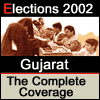December 18, 2002
|
|
|
|
|
Home >
Election >
Special
December 18, 2002 |
Feedback
|
|
|
The Rediff Election Special/
George IypeHindutva and more Hindutva The Bharatiya Janata Party has rediscovered the catchword for future elections: Hindutva. In one of the most bitterly fought assembly elections in India's history -- in Gujarat -- the BJP swept to victory on its Hindutva plank. The BJP badly needed this victory, since as many as nine states go to the polls in 2003 while the parliamentary election is due in 2004 and the party has not had much success to show in recent times. BJP spokesman Mukhtar Abbas Naqvi claimed the results vindicated the central leadership's hard-line stand against Pakistan-sponsored terrorism. "The people of the country have realized that our government is hard on crushing terrorism," he said. "The Gujarat poll results show that the [Atal Bihari] Vajpayee government's policies and programmes are in the right direction." But other BJP leaders and workers insist that credit for the victory goes to Chief Minister Narendra Modi, not Vajpayee. Said a senior BJP politician and member of the BJP think-tank, "What Vajpayee could not do in the last four years has been achieved by Modi. The BJP could not win any of the important assembly elections in the past few The BJP came to power as the leading partner in the National Democratic Alliance in March 1998 and retained power in the October 1999 election. But barring that major victory at the parliamentary level in the aftermath of the Kargil conflict, the party has suffered in most of the assembly elections that India's 28 states have been through. In 1998, the Congress was holding power in just five states -- Goa, Orissa, Madhya Pradesh, Nagaland, and Mizoram. Today, the party on its own and in alliance with others rules 16 states or Union territories -- Arunachal Pradesh, Assam, Bihar, Chhattisgarh, Delhi, Jammu and Kashmir, Karnataka, Kerala, Madhya Pradesh, Maharashta, Manipur, Nagaland, Pondicherry, Punjab, Rajasthan, and Uttaranchal. The BJP, on the other hand, apart from Gujarat, where it was re-elected to power this month, rules only Himachal Pradesh, Goa, and Jharkhand. Under Vajpayee's leadership, the party has cut a sorry figure, especially in Uttar Pradesh, Bihar, Punjab, Jammu and Kashmir, and Uttaranchal. Not surprisingly, many within the BJP now believe that a younger leader like Modi can revive the party's fortunes. And the party is looking to mix Hindutva with electoral politics, which will be evident in the elections due next year in Delhi, Himachal Pradesh, Madhya Pradesh, and Rajasthan. Moreover, the victory in Gujarat has enhanced the clout of the hard-line lobby within the BJP led by Deputy Prime Minister Lal Kishenchand Advani and his protégé Modi. Supporting it is the Vishwa Hindu Parishad, which campaigned actively -- and effectively -- in Gujarat. In the coming days, the moderate leadership led by Vajpayee -- who once announced that he had at one point wanted to sack the Modi government for the communal violence in Gujarat -- is certain to come under considerable strain on various issues. Many hard-line Hindutva supporters are critical of Vajpayee for his position on divestment, building a Ram temple in Ayodhya, and for not being firm enough with Pakistan. Media reports had claimed that part of the BJP's low electoral appeal was due to the division within its ranks between the hard-liners and the moderates. Kerala BJP politician and Union Minister of State for Urban Development O Rajagopal pooh-poohed such talk of a divide within the party. "The so-called low popular appeal of the BJP has been a creation of the media. Look at our election results in Gujarat and see how effective are the BJP's politics and ideologies," he said. "The point is also that there is no hard-line and soft-line leadership in the BJP. We all worked together for the BJP's great victory." Off the record, BJP leaders agree that the Gujarat election has proved a point: the aggressive Hindutva strategy adopted by Modi and the VHP is the best bet for the party in the coming months. They admit that Modi's rhetoric of Hindutva and more Hindutva will increasingly be heard across the country as it gears up for the parliamentary election in 2004. So, will the party replicate the Gujarat model of electioneering? It is a question that BJP politicians not answering right now. "We are not apologetic about our Hindutva agenda," party president M Venkaiah Naidu said. "But it will be the non-performance of the Congress governments that will matter in Rajasthan, Madhya Pradesh, and Delhi." A clearer picture might emerge when the BJP national executive meets in the last week of December in New Delhi. The meeting has been convened to celebrate the party's spectacular success in Gujarat. The Rediff Election Specials
|
ADVERTISEMENT
|
|||||||||
|
Channels: News: Shopping: Services: |
Astrology | Auto | Contests | E-cards | Food | Health | Home & Decor | Jobs | Lifestyle | Matrimonial
Money | Movies | Net Guide | Product Watch | Romance | Tech.Edu | Technology | Teenstation | Travel | Women News | Cricket | Sports | NewsLinks Shopping | Books | Music Personal Homepages | Free Email | Free Messenger | Chat |
© 2002 rediff.com India Limited. All Rights Reserved. Disclaimer |
|